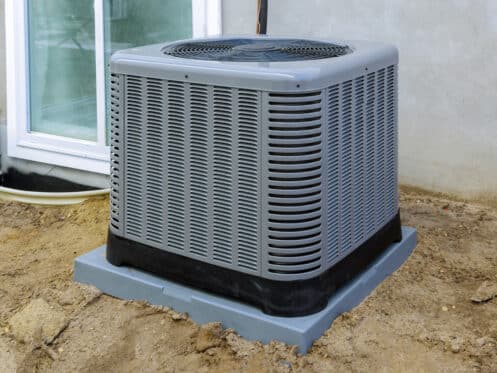Every appliance in your home, including your air conditioner, has an expiration date. Older models of air conditioners may last between 10 and 12 years, while modern units can last between 15 and 20 years when properly maintained.
The lifecycle of your air conditioner depends on how frequently you use it and whether you properly maintain it throughout its lifetime. Skipping AC tune-ups and maintenance, even in the early years after purchasing an air conditioner, may shorten its lifespan.
Other factors, such as the temperature where you live and how often you use your air conditioner, will impact its lifecycle. For instance, in Northern California, where winter temperatures can drop as low as 46° at night, you won’t use your air conditioner as much as in places like San Diego and Los Angeles. Temperatures there tend to be much warmer year-round. Therefore, you may need to replace your air conditioner more frequently in San Diego than up north.
Signs It Is Time to Replace Your Air Conditioner
Frequent Breakdowns
If you get annual tune-ups on your air conditioner, it shouldn’t be breaking down every summer. Most air conditioner issues stem from insufficient maintenance. During AC maintenance, technicians can preemptively identify issues with your AC before the summer cooling season begins.
Therefore, if your air conditioner experiences multiple breakdowns despite receiving proper maintenance, this usually indicates that it’s time to replace your air conditioner. Frequent breakdowns result in frequent repairs, and the cost of AC repairs can accumulate quickly. Eventually, purchasing a new unit will be more cost-effective than continually investing in expensive repairs for an older unit with an expired warranty.
Higher Than Usual Energy Bills
If the energy use in the home hasn’t increased, your energy bill should remain relatively stable month after month. However, if you’ve noticed a significant increase in your energy bills from one month to the next, it could indicate that your air conditioner is losing efficiency or malfunctioning. As air conditioners age, energy bills tend to rise, signaling that it’s time to consider purchasing a new unit.
Your Air Conditioner Uses R–22 Freon
As of January 1, 2020, the United States ceased the production of Freon. R-22 Freon has been identified as having detrimental effects on the environment, prompting the EPA to phase out its use. If an air conditioner that relies on Freon breaks down and requires a refill or repair, no Freon is available. Consequently, the air conditioner will need to be replaced with one that does not use Freon.
Consider How Well Your Current Air Conditioner Is Working
A properly functioning air conditioner should maintain your home at the temperature you selected without significant fluctuation. All rooms throughout your home should be evenly cooled. When activated, your air conditioner should not produce loud or strange noises. If your older unit is not performing as effectively as it once did, an HVAC technician can assess whether simple repairs are sufficient or if there is a larger issue. They may suggest that you consider replacing your air conditioner.
The Efficiency of Your Air Conditioner
Close to 50% of your home’s energy bill is likely attributed to heating and cooling. If your air conditioner has become less efficient due to age, you’ll notice this reflected in your monthly energy bill. Even air conditioners that are only five or six years old can be significantly less efficient than newer models. Replacing an older, less efficient air conditioner with a newer, more energy-efficient model could lead to lower energy bills and a longer lifespan for your California home’s air conditioner.
When to Consider Air Conditioning Repair Versus Air Conditioning Replacement
When to Consider Repair
You may want to consider repairing your existing air conditioner if it is less than ten years old and does not require frequent repairs. This is particularly true if the repair is a one-time occurrence. Consulting with an HVAC technician about the repair can provide insight into whether the issue is an isolated incident or indicative of potential future problems. If your current air conditioner meets the cooling needs of your California home, your electric bills are reasonable, and it is functioning well overall, replacing a minor issue may be more cost-effective.
When to Consider AC Replacement
If you find a new system that meets your cooling needs and is competitively priced compared to repairing your old unit, opting for a replacement may be a viable option. Modern air conditioners are more energy-efficient, potentially offsetting the cost difference through energy savings.
Alternatively, if your older air conditioner is causing overwhelming energy bills despite regular maintenance efforts, it may be more economical to invest in a new, energy-efficient unit.
Are you considering selling your home in the next few years? A new air conditioner can enhance your home’s resale value. Even if selling isn’t immediate, a new unit can make a significant difference in attracting potential buyers and closing the sale at a higher value. The housing market can be competitive in California. Having upgrades to boast about in your listing is optimal.
Common Repair Issues Requiring an Air Conditioner Replacement
A Damaged Compressor
The compressor is the heart of your AC system. It is where energy is passed to the refrigerant, allowing it to circulate through the air conditioner and create heat exchange. During the summer in California, the compressor undergoes a lot of strain. The wear and tear on the motor and its parts could cause it to burn out. Replacing a compressor is a very expensive repair. Most people find buying a new air conditioner more cost-efficient than purchasing and installing a new compressor. A key to preventing compressor damage is annual spring maintenance. If you hear your air conditioner making grinding noises or it has a hard start, talk to your HVAC technician and have them look.
Sealing Refrigerant Leaks and Recharging Refrigerant
Leaks can happen in the refrigerant lines of an air conditioning unit, causing a loss of cooling power. Eventually, this can lead to a complete system shutdown. These things happen because of corrosion and chemicals in the household air. If a refrigerant leak is not caught quickly, it could lead to catastrophic damage. It may be more cost-effective to purchase a new air conditioner than repair the existing one.
Do Not Skip on Maintenance
In addition to factors such as the quality of installation, the type of air conditioning unit purchased, and the climate conditions where the air conditioner is installed, regular maintenance plays a crucial role in determining the lifespan of your air conditioner. Proper maintenance can extend the lifespan from 8 years to 15 years or more.
During routine maintenance, HVAC technicians inspect various components of your air conditioner, including filters, coils, fans, and electrical units. By addressing any issues and ensuring optimal performance, regular maintenance helps maximize the lifespan of your air conditioner.
Work With a Top-Rated HVAC Company in Victorville, CA
At Aace's Heating, Air Conditioning & Swamp Coolers, we work hard to provide HVAC services that homeowners and businesses can trust. We are proud to have an A+ Better Business Bureau rating and several awards and certificates from respected organizations in our field. We are committed to honesty, punctuality, and transparency.
Our services include HVAC installation, maintenance, and repair of properties in the Victorville area. We install mini-splits and heat pumps, offer a comprehensive maintenance plan, and even install swamp coolers. Contact Aace's Heating, Air Conditioning & Swamp Coolers today and see for yourself how our culture and commitment to our customers set us apart.






